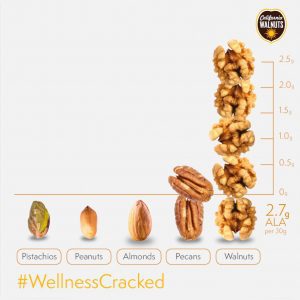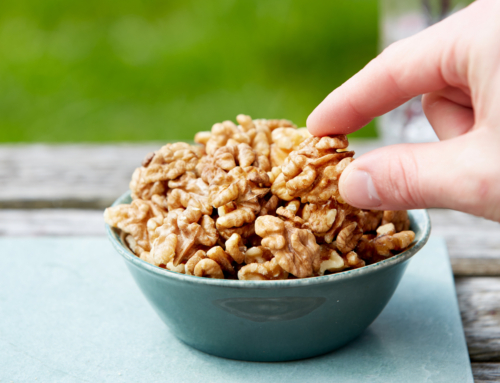7 reasons to enjoy California Walnuts
We’re kicking off a brand-new campaign – 7 ways with California Walnuts.
Why 7 ways? Well, because we want you to be able to enjoy a handful of California Walnuts every day, and there are so many different ways to do this!
But, before we get started on the different ways, lets kick things off by looking at our top 7 reasons to enjoy California Walnuts
Here’s why adding a handful of California Walnuts to your diet can make all the difference.
1. They’re important for heart health…
Over 30 years of research suggests that California Walnuts may offer benefits for heart health.
Walnuts are the only tree nut to contain a rich source of omega 3 ALA, 2.7g/ 30g*, which research has shown to have a beneficial role in the prevention and reduction of heart disease[1] and is just one of the reasons California Walnuts have been given the heart healthy seal of approval from the cholesterol charity HEART UK.
Omega-3 ALA can also contribute to the maintenance of normal blood cholesterol levels[2]. High cholesterol is a risk factor in the development of coronary heart disease. The EU has also approved the health claim that a handful of walnuts a day (30g) can have a positive effect on the elasticity of the blood vessels and can thus help keep the cardiovascular system healthy.[3]

2. As well as cognitive and mental health…
Research shows that eating nuts, including walnuts, may be related to better overall cognition at older ages, according to a study of 15,467 older women (aged 70 or above), without a history of stroke [4].
Consuming walnuts may also be associated with a lower prevalence and frequency of depression symptoms. Researchers using data on 26,656 adult participants from the National Health and Nutrition Examination Survey (NHANES survey) for 2005 through 2014 found that depression scores were 26% lower for walnut consumers and 8% lower for consumers of other nuts, compared to those who did not consume nuts at all[5].
3. And not to forget the gut.
Emerging research suggests that walnuts may be one food to consider for gut health.
A small study in 18 healthy adults revealed that eating walnuts versus eating none positively affected the composition and function of the human gastrointestinal microbiota.[6]
4. Walnuts can help you feel fuller for longer
Walnuts can be part of a healthy diet that makes you feel fuller longer, helping to prevent overeating or snacking on less healthy options. Walnuts’ nutrient dense unique profile also makes meeting the EatWell Guide recommendations easy and delicious. Incorporating walnuts into meals and snacks is a simple and convenient way to add important nutrients to your diet.
For recipe ideas and inspiration, please visit the recipe page of our website here.
- California Walnut Muesli Baked Nectarines
- Spring Vegetable, Chicken & Walnut Pasta
- Sticky Walnut & Marmalade Sausage Traybake
5. And play a part in lowering your diabetes risk.
Research demonstrates the importance walnuts may play as part of a healthy diet to help manage diabetes and metabolic syndrome. An epidemiological study representing more than 34,000 American adults suggests those who consume walnuts may have about half the risk of developing type 2 diabetes, compared to adults who do not eat nuts.[7]
6. Plus, they taste great.
California Walnuts have a mild and creamy flavour and soft consistency, making them an excellent choice for both sweet and savoury dishes. The taste, texture and nutrition benefits of California Walnuts also makes them a great plant-based meat substitute in many of your favourite meals.
Did you know though, that for great tasting walnuts, all of the time, they are best kept in the fridge. Walnuts should be used within 6 months when stored in the refrigerator. For longer storage, place them in a freezer for up to 12 months. They thaw quickly and can be used almost immediately. When storing walnuts in the fridge, store them away from foods with strong odours (e.g. fish, cabbage, onions) as walnuts can absorb the flavours of other foods.
7. And can give you an Omega-3 boost!
Walnuts are the only tree nut to contain a significant amount of the plant-based omega-3, alpha-linolenic acid (ALA), 2.7g/ 30g (approx. a handful). Walnuts also offer 4.4g of protein and 1.4g of fibre[8]. Walnuts are also low in sugar and very low salt[9].
For a healthy boost, add them to a variety of dishes, both sweet and savoury, for texture and flavour. Look out for our brand-new recipes coming soon.

*Approx. a handful








